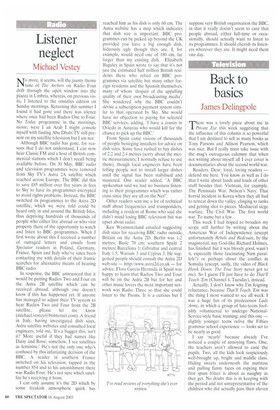Listener neglect
Michael Vestey
No more, it seems, will the jaunty theme tune of The Archers on Radio Four drift through the open window into the piazza in Umbria, whereas, on previous visits, I listened to the omnibus edition on Sunday mornings. Returning this summer I found it had gone and there was silence where once had been Radios One to Four. No Today programme in the mornings, niente; were I an Arab I might console myself with finding Abu Dhabi TV still present on my satellite television but I am not.
Although BBC radio has gone, for reasons that I do not understand, I can now hear Classic FM and a host of British commercial stations which I don't recall being available before. On 30 May, BBC radio and television programmes were removed from Sky TV's Astra 2A satellite which reached across Europe. The BBC did this to save £85 million over five years in fees to Sky to have its programmes encrypted to avoid rights problems. Instead, the BBC switched its programmes to the Astra 2D satellite, which we were told could be heard only in and around the British Isles, thus depriving hundreds of thousands of people who either live abroad or who visit property there of the opportunity to watch and listen to BBC programmes. When I first wrote about this I received a number of outraged letters and emails from Spectator readers in Poland, Germany, France, Spain and Italy who've since been contacting me with details of their frantic searches for alternative means of hearing BBC radio.
In response, the BBC announced that it would be putting Radios Two and Four on the Astra 2B satellite which can be received abroad, although one doesn't know if this has happened yet. If anyone has managed to adjust their TV system to hear Radios Two and Four from the 2B satellite, please let me know (michael.vestey@btinternet.com). A friend in Italy, having investigated dish sizes, Astra satellite websites and consulted local engineers, told me, 'It's a bugger this, isn't it? More useful if they had names like Daisy and Rose; somehow, I see satellites as feminine.' He's not the only one who's confused by this infuriating decision of the BBC. A reader in southern France switched on his television, tapped in the number 854 and to his astonishment there was Radio Four. He's not sure which satellite he's receiving it from.
I can only assume it's the 2D which by some freakish atmospheric quirk has reached him as his dish is only 60 cm. The Astra website has a map which indicates that dish size is important. BBC programmes can be picked up beyond the UK provided you have a big enough dish, hideously ugly though they are. I, for example, would need one of 180 cm, far larger than my existing dish. Elizabeth Baguley in Spain wrote to say that it's not just the estimated half million British residents there who relied on BBC programmes via satellite but many other foreign residents and the Spanish themselves, many of whom 'despair of the appalling quality of their own broadcasting media'. She wondered why the BBC couldn't devise a subscription payment system similar to that operated by Sky. She would have no objection to paying for selected BBC services, adding, 'I have a cousin in Oviedo in Asturias who would kill for the chance to pick up the BBC.'
From Spain came visions of thousands of people besieging installers for advice on dish sizes. Some have rushed to buy dishes of 2.2 and 2.4 metres (sorry about the metric measurements; I normally refuse to use them), though local engineers have been telling people not to install larger dishes until the signal has been stabilised and mastered. One reader added, 'A BBC spokesman said we had no business listening to their programmes which was rather crass since they are all on the Net!'
Other readers sent me a lot of technical stuff about frequencies and transponders, including a resident of Rome who said she didn't mind losing BBC television but was upset about radio.
Ken Westmoreland emailed suggesting dish sizes for receiving BBC radio outside Britain on the Astra 2D. Berlin was 1.2 metres; Basle 70 cm; southern Spain 2 metres; Barcelona 1; Gibraltar and central Italy 1.5; Warsaw 3 and Cyprus 3. He suggested people should consult the Astra 2D web-site — http://wvvw.astra2d.co.uk — for advice. Flora Garcia Hermida in Spain was happy to learn that Radios Two and Four will be on the Astra 2B but for her and other music lovers the most important network was Radio Three so that she could listen to the Proms. It is a curious but I suppose very British organisation the BBC, in that it really doesn't seem to care that people abroad, either full-time or occasionally, should actually want to listen to its programmes. It should cherish its listeners wherever they are. It might need them one day.










































































 Previous page
Previous page